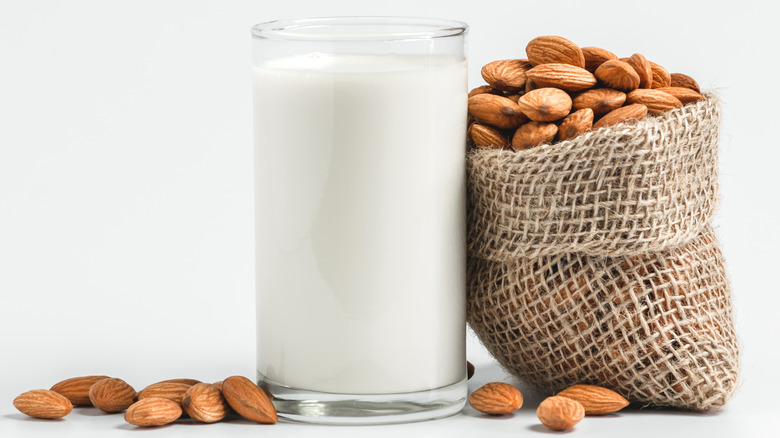Throw Your Almond Milk Away Immediately If You Notice This
It's no surprise that milk, or any dairy product for that matter, can spoil fairly quickly, and once it goes bad, the sight and smell of it can be pretty nasty. When you make the switch to a dairy-free alternative, such as almond milk, you're probably thinking there's a better chance that it won't spoil as fast. Unfortunately, this non-dairy beverage does eventually spoil and when it happens, according to Epicurious, it's not a particularly pleasant experience.
According to Does It Go Bad, a carton of unopened, shelf-stable almond milk may be safe to use for about two months after its best by date, and for a maximum of 10 days once it's opened and refrigerated. As for fresh almond milk from the refrigerated section, you can use it for about five to seven days past its best by date if unopened, and enjoy it for about a week after it's been opened. When it comes to the homemade kind, you're only good to use it for about three to four days.
Regardless of how long the dairy alternative can stay fresh based on its expiration date, there are some telltale signs that it has soured.
Take note of the smell and consistency
According to Pure Wow, spoiled almond milk will have a similar smell and taste to that of rancid nuts. The best way to tell if it has gone bad is to smell it. Chances are, you'll be hit with an intense, sour smell as soon as you open the container. Almond milk that has gone bad will also have a noticeably thicker consistency and may start to develop clumps. However, Epicurious shares that it's natural for this non-dairy beverage to separate. If you notice it has separated, but it's free of clumps, simply shake the container and it should be ready to go.
You'll want to toss your almond milk if you notice the container is leaking or puffed out, per Does It Go Bad, but really, when in doubt of your milk's freshness, it's probably for the best to toss it rather than take the risk of getting food poisoning.
To ensure freshness for as long as possible, Does It Go Bad recommends storing milk in a bottle, carton, or container at the back of the fridge. Storing it in the door will likely not have the same effect, as the temperature of the refrigerator door often fluctuates depending on how often it's opened.

